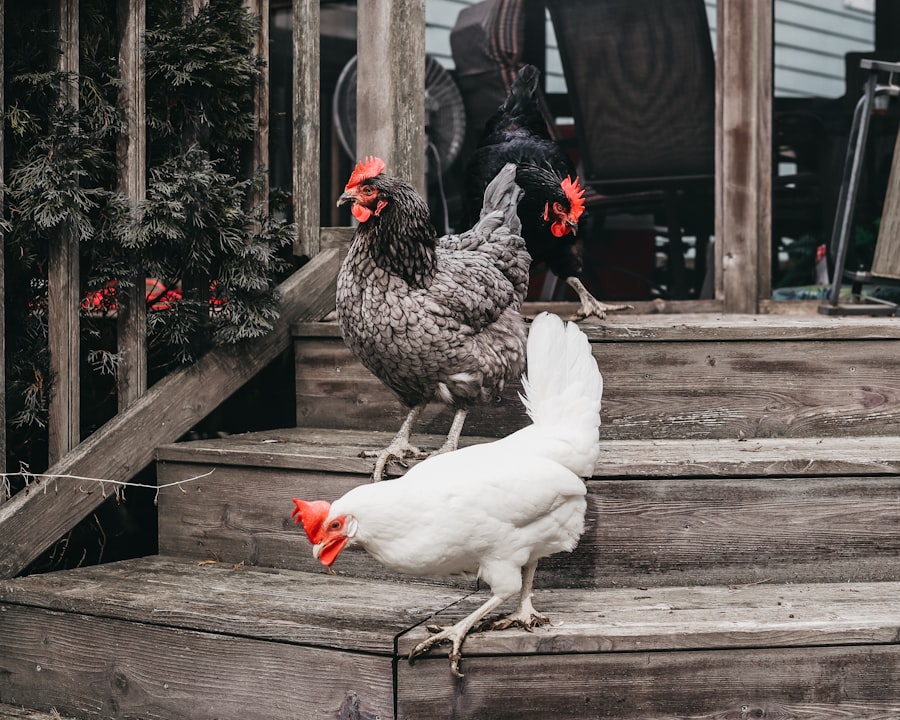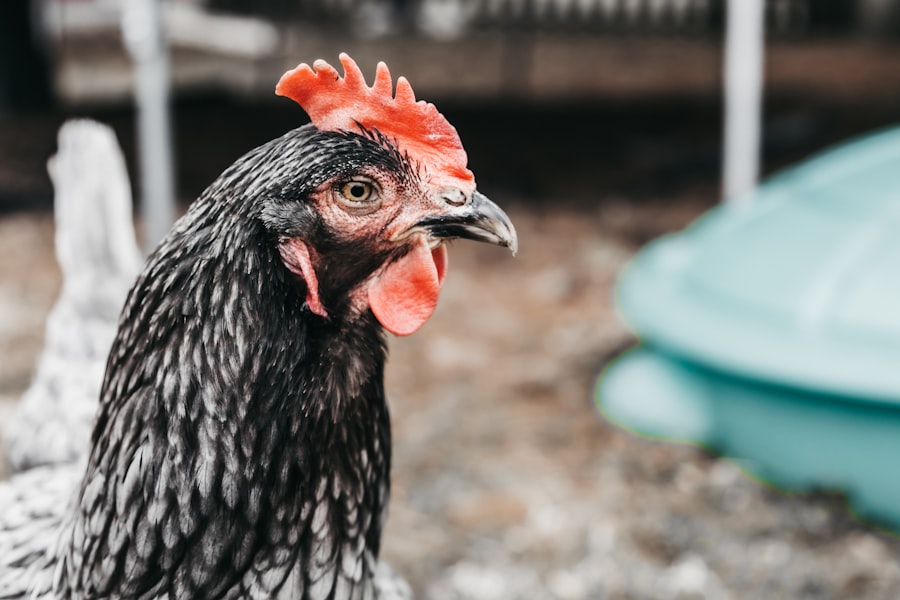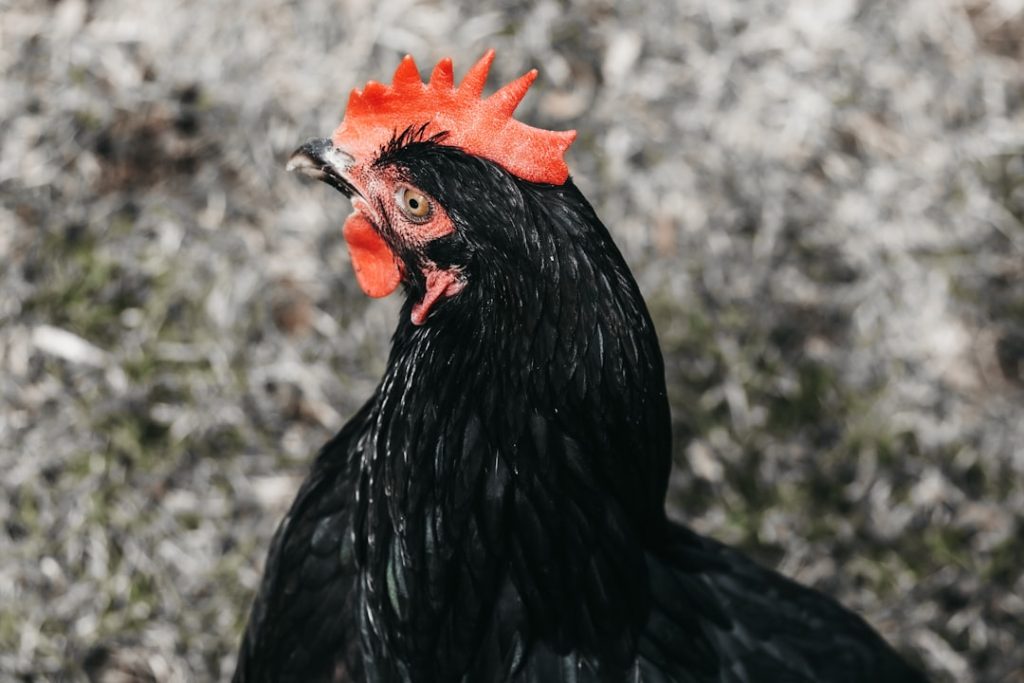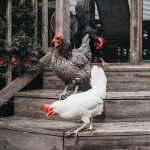Chickens are known for their ability to escape from enclosures, which can be frustrating for their owners. The reasons for these escape attempts can vary, but chickens are generally resourceful and determined animals. They may seek more space, better food sources, or simply the opportunity to explore.
This behavior can be challenging for chicken owners, who often find themselves repairing fences or pursuing escaped birds. Understanding why chickens attempt to escape is essential for developing effective containment strategies. Chickens are natural foragers with an innate drive to explore their surroundings.
They constantly search for new food sources and opportunities to scratch and peck at the ground. This curiosity can lead them to test the boundaries of their enclosures and find ways to slip through gaps or climb over barriers. Additionally, chickens are social animals that benefit from interaction with their flock mates.
They may attempt to escape to join other chickens or seek companionship. Overcrowding or lack of stimulation within the coop can also motivate chickens to seek freedom outside their confines. By understanding these behaviors, chicken owners can implement proactive measures to prevent escapes and ensure the safety and well-being of their birds.
Table of Contents
Key Takeaways
- Chickens are natural escape artists and will find ways to get out if given the opportunity.
- Understanding chicken behavior is crucial in preventing escapes, as it allows for proactive measures to be taken.
- Common reasons for chicken escapes include seeking food, exploring, and avoiding overcrowding.
- Preventing chickens from getting out involves regular maintenance of the coop, checking for weak spots, and providing enough space and enrichment.
- Creating a secure chicken coop and implementing effective fencing solutions are essential in keeping chickens contained and safe.
Understanding the Behavior of Chickens
Natural Foraging Instincts
Chickens are natural foragers, spending much of their time scratching and pecking at the ground in search of insects, seeds, and other tasty morsels. This behavior is deeply ingrained in their instincts and drives them to explore their surroundings in search of food.
Additionally, chickens are social animals that thrive on interaction with their flock mates. They form strong bonds with other chickens and seek out companionship and socialization. This drive for social interaction can lead them to attempt escapes in order to join other chickens or seek out new companions.
Intelligence and Adaptability
Furthermore, chickens are highly adaptable creatures that are constantly seeking out new experiences and opportunities for enrichment. They are intelligent and curious animals that require mental stimulation to thrive. When confined to a small or unstimulating environment, chickens may become restless and seek out ways to escape in search of new experiences. Understanding these behaviors can help chicken owners create a more enriching environment for their birds, as well as take proactive measures to prevent escapes and keep their chickens safe and secure.
Common Reasons for Chickens Escaping

There are several common reasons why chickens may attempt to escape from their enclosures. Understanding these reasons is crucial for implementing effective solutions to prevent escapes and keep chickens safely contained. One common reason for chicken escapes is overcrowding within the coop or run.
When chickens are confined to a small space with limited room to move and interact with their flock mates, they may become restless and seek out ways to escape in search of more space and freedom. Additionally, a lack of mental stimulation and enrichment within the coop can drive chickens to attempt escapes in search of new experiences and opportunities for exploration. Another common reason for chicken escapes is the presence of predators or perceived threats in the vicinity of the coop.
Chickens have a strong instinct for self-preservation and will go to great lengths to avoid potential dangers. If they sense the presence of predators or other threats nearby, they may attempt to escape in order to find a safer location. Additionally, chickens may be motivated to escape by a desire for better food or access to fresh vegetation and insects.
If the food provided within the coop is unappealing or insufficient, chickens may seek out alternative sources of sustenance outside their enclosures.
How to Prevent Chickens from Getting Out
Preventing chickens from escaping requires a proactive approach that addresses the underlying reasons for their escape attempts. One effective strategy is to ensure that the coop and run provide ample space for the chickens to move around and engage in natural behaviors such as scratching, pecking, and dust bathing. Providing plenty of enrichment such as perches, dust bathing areas, and hanging treats can also help keep chickens occupied and content within their enclosures.
Additionally, ensuring that the coop is predator-proof with secure latches, sturdy wire mesh, and a solid roof can help alleviate the chickens’ fears of potential threats and reduce the likelihood of escape attempts. Another important aspect of preventing chicken escapes is providing a varied and nutritious diet that meets the chickens’ nutritional needs. This can help reduce the motivation for chickens to seek out alternative sources of food outside their enclosures.
Regularly providing fresh vegetation, fruits, and insects can also help keep chickens satisfied and less inclined to attempt escapes in search of better food. Finally, regular interaction with the chickens, such as spending time in the coop or run, providing treats, and engaging in gentle handling can help strengthen the bond between the chickens and their owners, reducing the likelihood of escape attempts driven by a desire for social interaction.
Creating a Secure Chicken Coop
Creating a secure chicken coop is essential for preventing escapes and ensuring the safety and well-being of the birds. A well-designed coop should provide ample space for the chickens to move around comfortably, as well as protection from predators and potential threats. When building or renovating a chicken coop, it’s important to use high-quality materials such as sturdy wood or metal framing, durable wire mesh, and solid roofing to create a secure structure that can withstand potential escape attempts by the chickens or attacks from predators.
Additionally, ensuring that the coop has secure doors with strong latches can help prevent unauthorized entry by predators or other animals that may pose a threat to the chickens. It’s also important to regularly inspect the coop for any signs of wear or damage, such as loose wire mesh or rotting wood, and promptly repair any issues to maintain the integrity of the structure. Providing adequate ventilation and natural light within the coop can also help create a comfortable and healthy environment for the chickens, reducing stress and potential motivations for escape.
Implementing Effective Fencing Solutions

Fence Height and Material
Additionally, ensuring that the fence is tall enough to prevent chickens from flying over it can help reduce the likelihood of escape attempts. A sturdy fence with buried wire mesh can help deter digging predators such as foxes or raccoons, as well as prevent chickens from tunneling under the fence.
Additional Security Measures
Adding a wire mesh roof or netting over the run can further deter aerial predators such as hawks or owls while also preventing chickens from flying over the fence. Regularly inspecting the fence for any signs of wear or damage, such as loose posts or sagging wire mesh, is important for maintaining its effectiveness in keeping the chickens safely contained. Additionally, removing any potential perches or objects near the fence that could aid in escape attempts can help reduce the likelihood of successful escapes.
Creating a Secure Environment
Providing visual barriers such as shrubs or trees around the perimeter of the run can also help reduce stress and anxiety in the chickens by creating a more natural and secure environment.
Seeking Professional Help for Persistent Chicken Escapes
In some cases, despite best efforts, some chicken owners may find themselves dealing with persistent escape attempts by their birds. In such situations, seeking professional help from experienced poultry keepers or animal behaviorists can provide valuable insights and guidance on addressing the underlying reasons for the escapes and implementing effective solutions. Professional poultry keepers can offer advice on coop design, fencing solutions, and management practices that can help prevent escapes and create a more enriching environment for the chickens.
Additionally, consulting with an animal behaviorist can provide valuable insights into understanding the motivations behind the escape attempts and implementing behavioral modification techniques to address any underlying issues driving the behavior. By seeking professional help, chicken owners can gain a deeper understanding of their birds’ behaviors and needs, as well as access valuable support in creating a safe and secure environment that meets the physical and psychological needs of their feathered friends. In conclusion, understanding the motivations behind chicken escapes is crucial for implementing effective solutions to prevent them from getting out.
By addressing factors such as space limitations, lack of enrichment, predator threats, and inadequate nutrition, chicken owners can create a secure coop and run that meets the needs of their birds while reducing the likelihood of escape attempts. Implementing effective fencing solutions and seeking professional help when needed can further support efforts to keep chickens safely contained and ensure their well-being. With proactive measures and a deeper understanding of chicken behavior, chicken owners can create a safe and enriching environment that meets the physical and psychological needs of their feathered friends while preventing escapes.
If you’re having trouble keeping your chickens from getting out, you may want to consider the size of your coop. According to Poultry Wizard, the size of the coop is an important factor in keeping your chickens contained. A larger coop may provide more space for your chickens to roam and reduce the likelihood of them escaping.
FAQs
What are common reasons why chickens keep getting out?
Some common reasons why chickens keep getting out include inadequate fencing, gaps or holes in the fencing, lack of proper containment measures, and the presence of predators or other animals that may be causing the chickens to escape.
How can I prevent my chickens from getting out?
To prevent chickens from getting out, it is important to ensure that the fencing around their enclosure is secure and in good condition. Regularly inspect the fencing for any gaps, holes, or weak spots, and make necessary repairs. Additionally, consider adding a secure cover or roof to the enclosure to prevent chickens from flying out.
What are some effective containment measures for keeping chickens in their enclosure?
Effective containment measures for keeping chickens in their enclosure include using hardware cloth or welded wire fencing with small openings to prevent chickens from squeezing through or getting out. Adding an electric fence or poultry netting can also be effective in deterring chickens from escaping.
How can I protect my chickens from predators if they keep getting out?
If your chickens keep getting out and are at risk of predators, consider installing predator-proof fencing, using motion-activated lights or sound devices to deter predators, and providing a secure coop for the chickens to retreat to at night. Additionally, consider using guard animals such as dogs or llamas to protect the chickens from predators.
Meet Walter, the feathered-friend fanatic of Florida! Nestled in the sunshine state, Walter struts through life with his feathered companions, clucking his way to happiness. With a coop that’s fancier than a five-star hotel, he’s the Don Juan of the chicken world. When he’s not teaching his hens to do the cha-cha, you’ll find him in a heated debate with his prized rooster, Sir Clucks-a-Lot. Walter’s poultry passion is no yolk; he’s the sunny-side-up guy you never knew you needed in your flock of friends!







